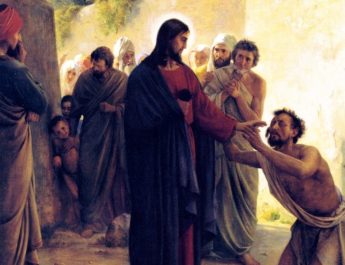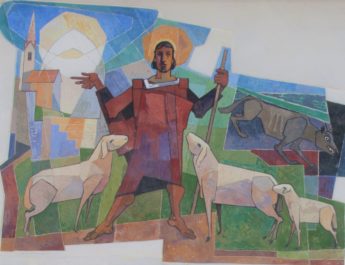Matthew 18:21-35
Ordinary A42
21 Then PeterA came and said to him, “Lord,B if another member of the churchC sinsD against me,
A “Peter” = petros. Related to petra (large rock that is connected and or projecting like a rock, ledge, or cliff; can also be cave or stony ground). This is Peter, a stone, pebble, or boulder.
B “Lord” = kurios. From kuros (authority, supremacy). This is a respectful address meaning master or sir. It refers to one who has control or power greater than one’s own. So, it was also applied to God and Jesus as Master or Lord.
C “member of the church” = adelphos. From a (with, community, fellowship) + delphus (womb). This is a brother in a literal or figurative sense. It is also used of another member of the Church.
D “sins” = hamartano. From a (not) + meros (a part or share, portion); {from meiromai (to get one’s allotment or portion)}. This term also used of archers not hitting their targets. Literally, it means not getting your share or to miss the mark. Figuratively, it meant to do wrong or to sin.
how often should I forgive?E As many as seven times?”F
22 JesusG said to him, “Not seven times, but, I tell you, seventy-seven times.
E “forgive” = aphiemi. From apo (from, away from) + hiemi (to send). This is send away, release, permit, forgive, allow to depart, discharge, or send forth.
F “seven times” = heptakis. 4x in NT – each in reference to forgiving seven times in the Gospels. From hepta (seven or seventh; figuratively, the number of completeness or perfection). This is seven times.
G “Jesus” = iesous. From Hebrew Yehoshua (Joshua, the Lord is salvation); {from YHVH (proper name of the God of Israel; the self-existent and eternal one); {from havah (to become) or from hayah (to come to pass, become, be)} + yasha (to deliver, defend, help, preserve, rescue; properly, to be open, wide or free, which implies being safe. So, in a causative sense, this is to free someone). This is Jesus or Joshua in Greek – the Lord saves or the Lord is salvation.
23 “For this reason the kingdomH of heavenI may be compared to a kingJ who wishedK to settleL accountsM with his slaves.N
H “kingdom” = basileia. From basileus (king, emperor, sovereign); probably from basis (step, hence foot; a pace); from baino (to walk, to go). This is kingdom, rule, authority, sovereignty, royalty, a realm.
I “heaven” = ouranos. May be related to oros (mountain, hill) with the notion of height. This is the air, the sky, the atmosphere, and heaven. It is the sky that is visible and the spiritual heaven where God dwells. Heaven implies happiness, power, and eternity.
J “king” = anthropos + basileus. Literally “a man, a king.” Anthropos is probably from aner (man, male, husband) + ops (eye, face). This is human, humankind. Used for all genders. Basileus is related to “kingdom” in v23. See note H above.
K “wished” = thelo. This is to wish, desire, will, or intend. It is to choose or prefer in a literal or figurative sense. It can also mean inclined toward or take delight in. It can have a sense of being ready to act on the impulse in question.
L “settle” = sunairo. 3x in NT. From sun (with, together with) + airo (to lift up in a literal or figurative sense; to lift, carry, or raise; take away or remove; figuratively, raising the voice or level of suspense; sailing off as raising the anchor; atonement of sin as lift/remove sin). This is to take up together, which would be making a reckoning or comparing accounts. It is to settle or compute.
M “accounts” = logos. Related to “said” in v22. From lego (to speak, tell, mention). This is word, statement, speech, analogy. It is a word that carries an idea or expresses a thought, a saying. It could refer to a person with a message or reasoning laid out in words. By implication, this could be a topic, line of reasoning, or a motive. It can be used for a divine utterance or as Word – Christ.
N “slaves” = doulos. Perhaps from deo (to tie, bind, fasten, impel, compel; to declare something against the law or prohibited). This is used for a servant or for a slave, enslaved. It refers to someone who belongs to someone else. But, it could be voluntary (choosing to be enslaved to pay off debt) or involuntary (captured in war and enslaved). It is used as a metaphor for serving Christ. Slavery was not inherited (i.e. the children of slaves were not assumed to be slaves) and slaves could buy their way to freedom. Slavery was generally on a contractual basis (that is for the duration of how long it took you to pay your debt and/or save up enough money to buy your freedom).
24 When he began the reckoning,O one who owedP him ten thousandQ talentsR was brought to him;
O “reckoning” = sunairo. Same as “settle” in v23. See note L above.
P “owed” = opheiletes. 7x in NT. From opheilo (to be indebted morally or legally – having an obligation one must meet; perhaps from the legal world, but then adopted in reference to morality; used to refer to humanity’s ethical responsibility); probably from ophelos (advantage, gain, profit); from ophello (heaped together, accumulate, increase). This is one who owes so it is a debtor or someone under obligation. Figuratively, it is a culprit, delinquent, or a sinner.
Q “ten thousand” = murios. 3x in NT. Root may mean numerous. This can mean a large number, countless. In the plural, it can mean ten thousand.
R “talents” = talanton. 14x in NT – all in Matthew 18 & Matthew 25 in the Parable of the Unforgiving Servant and the Parable of the Talents. Perhaps from tlao (to bear). This is a balance as an amount that is weighed to make up a talent. A talent was around 3,000 shekels. A silver talent could be exchanged for around 6,000 denarii and gold ones about thirty times more.
25 and, as he could not pay,S his lord orderedT him to be sold,U together with his wifeV and childrenW and all his possessions,X and payment to be made.Y
S “he could not pay” = me + echo + de + autos + apodidomi. Lit “he had nothing to pay.” Apodidomi is from apo (from, away from) + didomi (give, offer, place, bestow, deliver; give in a literal or figurative sense). This is to give back, return, give away. It is to restore as when one makes payment – to rend what is due, to sell.
T “ordered” = keleuo. From kelomai (to urge on). This is to command, order, or direct.
U “sold” = piprasko. 9x in NT. From pernemi (to sell by export). This is to sell with travel involved. It can also mean to sell into slavery or to be devoted to.
V “wife” = gune. Perhaps from ginomai (to come into being, to happen, become, be born; to emerge from one state or condition to another; this is coming into being with the sense of movement or growth). This is woman, wife, or bride. This is where the word “gynecologist” comes from.
W “children” = teknon. From tikto (to beget, bring forth, produce). This is a child, descendant, or inhabitant.
X “all his possessions” = pas + hosos + echo. Literally “as much as he had.”
Y “payment to be made” = apodidomi. Same as “pay” in v25. See note S above.
26 So the slave fell on his kneesZ before him, saying, ‘Have patienceAA with me, and I will pay you everything.’
27 And out of pityBB for him, the lord of that slave releasedCC him and forgave him the debt.DD
Z “fell on…knees” = proskuneo. From pros (advantageous for, at, to, toward, with) + kuneo (to kiss); {may be related to kuno (dog)}. This is to do reverence, kneel, to prostrate oneself in homage, to worship.
AA “have patience” = makrothumeo. 10x in NT. From makros (long, long lasting) {from mekos (length); probably related to megas (great or large)} + thumos (passion, wrath; actions emerging from passion or impulse) {from thuo (to rush along, breathe violently, offer sacrifice)}. This is properly long tempered. It refers to one who delays anger, perseveres, or is patient. One could also say longsuffering or forbearing.
BB “out of pity” = splagchnizomai. 12x in NT– 8x of Jesus having compassion on people or crowds. From splanxnon (inner organs, entrails; seen as the root of emotions). This is moved to compassion from deep within oneself – visceral empathy or sympathy, being deeply moved.
CC “released” = apoluo. From apo (from, away from) + luo (to loose, release, untie; figuratively, to break, destroy, or annul; releasing what had been withheld). This is letting go, setting free, or releasing. So, it can be to discharge, dismiss, divorce, pardon, or set at liberty.
DD “debt” = daneion. Related to “pay” in v25. 1x in NT. From the same as danizo (to lend or borrow); from danos (a loan or gift); probably related to didomi (see note S above). This is a loan or debt.
28 But that same slave, as he went out, came uponEE one of his fellow slavesFF who owedGG him a hundred denarii;HH and seizingII him by the throat,JJ he said, ‘Pay what you owe.’
EE “came upon” = heurisko. This is to find, learn, or obtain. It is to discover something, which generally implies a period of searching for it. This is to find in a literal or figurative sense. This is where the word “heuristic” comes from.
FF “fellow slaves” = sundoulos. Related to “slaves” in v23. 10x in NT. From sun (with, together with) + doulos (see note N above). This is a fellow servant or slave. In a Christian setting, it can refer to a fellow mission worker. It is one who serves the same master whether that is God or a human master.
GG “owed” = opheilo. Related to “owed” in v24. See note P above.
HH “denarii” = denarion. 16x in NT. From Latin deni (ten each) + arius (belonging to). This is a silver Roman coin.
II “seizing” = krateo. From kratos (strength, power, dominion; vigor in a literal or figurative sense; power that is exercised). This is being strong or mighty so, by extension, to prevail or rule. It can also mean to seize, grasp hold of and thereby control. In this sense, it means arrest.
JJ “by the throat” = pnigo. 3x in NT. Perhaps from pneo (to blow, breath, breathe hard). This is to choke, wheeze, strangle, or drown.
29 Then his fellow slave fell down and pleadedKK with him, ‘Have patience with me, and I will pay you.’
30 But he refused;LL then he went and threwMM him into prisonNN until he would pay the debt.
KK “pleaded” = parakaleo. From para (beside, by, in the presence of) + kaleo (to call by name, invite, to name, bid, summon, call aloud) {related to keleuo (to command, order, direct); from kelomai (to urge on)}. This is to call to, summon, invite, request, or beg. It can also be exhort or admonish. Also, this can be encourage, comfort, or console. This word has legal overtones and is used of one’s advocate in a courtroom. It is the root of the name of the Holy Spirit “paraclete” is our advocate and comforter.
LL “refused” = ou + thelo. Literally “he was not willing.” Thelo is the same as “wished” in v23. See note K above.
MM “threw” = ballo. This is to throw, cast, rush, place, or drop. It is throwing, but it could be with more or less velocity and with more or less force/violence.
NN “prison” = phulake. From phulasso (to guard something so that it doesn’t escape – to watch over it vigilantly; being on guard in a literal or figurative sense); related to phulaks (military guard, sentry, watcher). This is the act of guarding, the person who guards, the place where guarding occurs (i.e. a prison), or the times of guarding (the various watches).
31 When his fellow slaves sawOO what had happened,PP they were greatlyQQ distressed,RR and they went and reportedSS to their lord all that had taken place.
OO “saw” = horao. To see, perceive, attend to, look upon, experience. Properly, to stare at and so implying clear discernment. This, by extension, would indicate attending to what was seen and learned. This is to see, often with a metaphorical sense. Can include inward spiritual seeing.
PP “happened” = ginomai. Perhaps related to “wife” in v25. See note V above.
QQ “greatly” = sphodra. 11x in NT. From sphodros (exceeding, very much, all out, violent). This is exceedingly, greatly, deeply. This is going all out, with total effort, done to the fullest extent.
RR “distressed” = lupeo. From lupe (pain, whether physical or mental; grief, sorrow, distress, a heavy heart). This is to be sad, grieve, distress, hurt, feel pain. It can be used for deep pain or severe sorrow as well as the pain that accompanies childbirth.
SS “reported” = diasapheo. 2x in NT. From dia (through, across to the other side, thoroughly) + saphes (clear). This is to make fully clear, declare, report.
32 Then his lord summonedTT him and said to him, ‘You wickedUU slave! I forgave you all that debtVV because you pleaded with me. 33 Should you not haveWW had mercyXX on your fellow slave, as I had mercy on you?’
TT “summoned” = proskaleo. Related to “pleaded” in v29. From pros (at, to, toward, with) + kaleo (see note KK above). This is to call to oneself, summon.
UU “wicked” = poneros. From poneo (to toil); related to ponos (pain, trouble, labor, distress, suffering; toil, which implies anguish); from the base of penes (a laborer, poor person, starving or indigent person; someone who works for their living); from pernomai (working for a living; laborer, poor person; to work for daily bread); from peno (to toil to survive day by day). This is bad, evil, wicked, malicious, grievous, or toilsome. Properly, it is something that bears pain – it emphasizes the miseries and pains that come with evil. By contrast, the Greek kakos refers to evil as part of someone’s core character. Also contrasting the Greek sapros, which deals with falling away from a previously embodied virtue. This word can mean ill, diseased, morally culpable, derelict, vicious, malicious, or guilt. It can also refer to the devil or sinners.
VV “debt” = opheile. Related to “owed” in v24 & “owed” in v28. From opheilo (see note P above). This is something that is due so it is a debt, obligation, or duty.
WW “should…have” = dei. Related to “slaves” in v23 & “fellow slaves” in v28. From deo (see note N above). This is what is necessary or proper. It is what is needed or what one should do – a duty or something inevitable. This refers to something absolutely necessary.
XX “had mercy” = eleeo. From eleos (mercy, pity, tender mercy, or compassion; generally understood in action by word or deed). This is to have pity on, show mercy to, be compassionate; often used for God’s grace. When we sing or say “kyrie eleison” (Lord, have mercy), it is from this root verb.
34 And in angerYY his lord handed him overZZ to be torturedAAA until he would pay his entire debt. 35 So my heavenlyBBB Father will also do to every one of you, if you do not forgive your brotherCCC or sister from your heart.”DDD
YY “in anger” = orgizo. 8x in NT. From orge (impulse, wrath, anger, passion, punishment); from orgao (something that teems or stews; this is anger rising from prolonged personal contact that is fixed rather than an angry outburst; it can also be anger that stems from an individual’s sense of right and wrong, justice, etc.). This is being angry, enraged, exasperated. It is a fixed, sustained anger.
ZZ “handed…over” = paradidomi. Related to “pay” in v25 & “debt” in v27. From para (beside, by, in the presence of) + didomi (see note S above). This is literally to hand over – hence to deliver, abandon, or betray. It implies a personal involvement.
AAA “tortured” = basanistes. Perhaps related to “king” and “kingdom” in v23. 1x in NT. Form basnizo (to torture, interrogate by torture, torment, batter with waves, examine, strain); from basanos (touchstone used to test metals; figuratively used for interrogating using torture, torment, pain sickness); perhaps from basis (see note H above). This is a torturer, a prison guard who interrogates judicially. It can also be a tormentor.
BBB “heavenly” = ouranios. 9x in NT. From ouranos (air, sky, the atmosphere, heaven; the sky that is visible; the spiritual heaven where God dwells; implies happiness, power, and eternity); {perhaps from oros (mountain, hill)}. This is heavenly or celestial. It can mean in, belonging to, or coming from heaven or the sky.
CCC “brother” = adelphos. Same as “member of the church” in v21. See note C above.
DDD “heart” = kardia. Literally the heart, but figuratively mind, character, inner self, will, intention, thoughts, feelings. Also, the center of something. The word heart is only used figuratively in the Old and New Testaments. This is where “cardiac” comes from.
Image credit: “Judgment Day” by Aaron Douglas, 1939.




